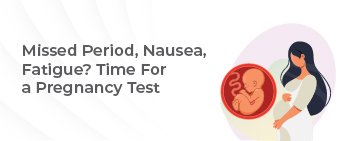Frequently Asked Questions
A pregnancy health checkup includes several blood tests and a urine test to assess important hormones like LH, progesterone, FSH, beta-HCG, and prolactin. Some doctors may also recommend tests to check free beta-HCG and testosterone levels. Additionally, tests like the Double Marker (Immulite) test are done to screen for chromosomal conditions of the fetus. These tests not only help to confirm the pregnancy, but also ensure that the hormone levels are balanced for a healthy pregnancy.
A pregnancy health check-up should be done as soon as you miss your period. You can self-test at home using a home pregnancy kit. If the results are positive, it is recommended to visit your doctor to confirm pregnancy. They will recommend hormonal tests to rule out any health concerns. Your doctor may also suggest additional tests to ensure the optimal health of both mother and baby from the very beginning.
A pregnancy-related urine and blood test does not require fasting. But, if your doctor has recommended tests like blood sugar or lipid profile screening as a part of your pregnancy health check, then you may be asked to fast for 8-12 hours before the test. It is better to confirm with your doctor about the specific tests you are required to take
Yes, you can and should take a pregnancy health check during the first trimester. Early testing helps your doctor confirm the pregnancy, assess hormone levels, and screen for any potential health risks to the mother or baby. It also enables your healthcare practitioner to plan the right care, nutritional plan and follow-up throughout the pregnancy.
A prenatal health check package includes a urine pregnancy test along with some important hormone assessment tests like LH, prolactin, FSH, progesterone and testosterone. It also measures beta-HCG (both free and total) to confirm the pregnancy. Additionally, some doctors may suggest a specialised screening such as a Double Marker (Immulite) test to assess the risk of chromosomal abnormalities in the baby.
Pregnancy health test results, such as those of urine and basic hormone level tests, are usually available within a few hours to one day. But, more advanced screening tests such as the Double Marker test may take up to 2 days.
Depending upon the stage of your pregnancy and your doctor’s recommendations, you may have to get tested once or twice in every trimester. Key health checks are done in the first trimester to confirm pregnancy and screen for early risks. Additional tests are usually done in the second and third trimesters to monitor the baby’s growth, development and the mother’s health. Patients who have any medical conditions or a history of risk factors may have to get more frequent testing.
Yes, with LifeCell Diagnostics, you can easily book a pregnancy health check at home. A trained professional will visit your home to collect a urine and blood sample. These samples are then tested in our lab to confirm your pregnancy and other related health conditions.
A general pregnancy test, including a urine and blood test, requires no preparation. But if your doctor has suggested a blood sugar or cholesterol test, then you may be asked to fast for 8 to 12 hours. Bring along any previous medical reports or prescriptions to help note down any previous symptoms or past disease history.
Yes, you can get basic pregnancy tests, like a urine test or routine blood work, without needing a doctor’s prescription. But, specialised pregnancy tests such as hormone panels or the Double Marker test are usually recommended by a doctor based on your medical history.





